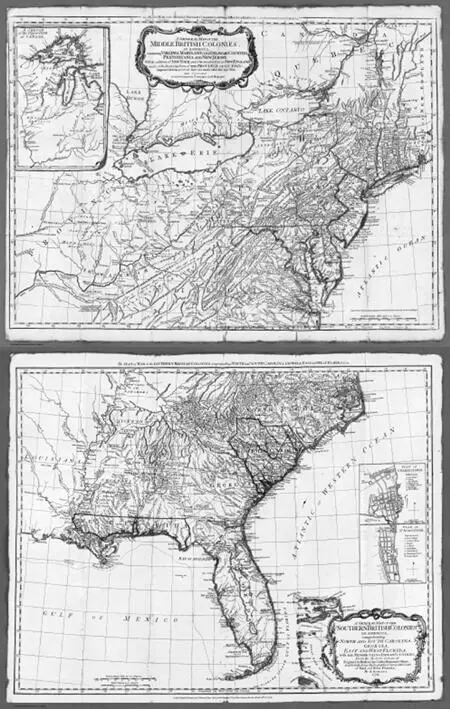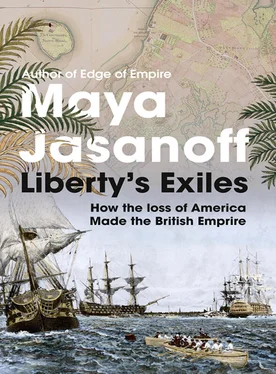Elizabeth Lichtenstein Johnston, a middle-class loyalist from Georgia, was acutely aware of living in a world in motion. In her late teens when the war ended, Johnston led her growing family through the emptying British outposts of the south: Savannah, Charleston, and St. Augustine in turn. These journeys prefigured a longer postwar odyssey, when the Johnstons established homes in Scotland, Jamaica, and at last Nova Scotia, fully twenty years after their peregrinations began. The family of New York landed magnate Beverley Robinson provides an instructive parallel to the Johnstons, from a position of greater privilege. War reduced Robinson from sprawling acres in America to a modest dwelling in Gloucestershire. But he invested his remaining resources in placing his children in the military, one of the best mechanisms for upward mobility the British Empire had to offer. Robinsons went on to thrive in imperial service everywhere from New Brunswick to Jamaica, Gibraltar, Egypt, and India. Some of Robinson’s grandchildren even found fortune where their forebears had lost it, back in New York. Between them, the Johnston and Robinson families bring to life preoccupations shared by the majority of white loyalist refugees: to maintain social rank and respectability; to rebuild family fortunes; and to position their children for success. Their papers also give poignant insight into the emotional consequences of war on refugees coping with loss, dislocation, and separation.
Many refugees saw their journeys as devastating personal setbacks. But some realized that these turbulent times might offer great opportunities as well. Perhaps the most visionary of these dreamers was North Carolina merchant John Cruden, who watched both his fortune and British supremacy collapse around him, yet tirelessly promoted schemes to restore both. Cruden’s projects to rebuild a British-American empire showed just how dynamic British ambitions remained after the war. In similar vein, Maryland loyalist William Augustus Bowles “went native” among the Creek Indians, and used his position between cultures to promote the creation of a loyal Indian state on the southwestern U.S. border. A more substantial effort to assert Indian sovereignty was led by Mohawk sachem Joseph Brant, the most prominent North American Indian to portray himself as a loyalist. From his postwar refuge near Lake Ontario, Brant aimed to build a western Indian confederacy that could protect native autonomy in the face of relentless white settler advance.
For black loyalists, of course, the losses inflicted by revolution were offset by an important gain: their freedom. This was the first step toward futures few could have imagined. David George, born into slavery in Virginia, found both freedom and faith as a Baptist convert in revolutionary South Carolina. After the war he emigrated to Nova Scotia, where he began to preach, quickly forming whole Baptist congregations around him. When he decided a few years later to seek a new Jerusalem in Sierra Leone, many of his followers made the journey with him. Networks of faith connected black loyalists around the Atlantic. George’s spiritual mentor George Liele traced another line from the backcountry into the British Empire when he evacuated with the British to Jamaica, where he founded the island’s first Baptist church.
To reconstruct these individual journeys, I have visited archives in every major loyalist destination to find refugees’ own accounts of what happened to them. The interpretations people give of their behavior are usually refined in retrospect, and many of the writings loyalists produced about themselves had some agenda. This was manifestly the case for the single biggest trove of documents, the records of the Loyalist Claims Commission, set up to compensate loyalists for their losses. Every claimant had a vested interest in proving the strength of his or her loyalty, the intensity of suffering, and the magnitude of material loss. The best sources relating to black loyalists display another bias, having been shaped by British missionaries keen to advance an evangelical purpose. The most accessible sources concerning Indian nations were produced for and by white officials, placing an imperial filter over their contents. And then there were the usual distortions wrought by memory. Personal narratives written many decades after the war, like Elizabeth Johnston’s, often emphasized tragedies, injustices, and resentments that lingered in the mind long after more benign recollections had faded. Early-nineteenth-century accounts produced in British North America, especially, could be skewed as heavily toward portraying loyalists as victims as competing accounts in the United States were toward presenting them as villains.
No sources of this kind are ever purely objective. But the way people tell their stories—what they emphasize, what they leave out—can tell the historian as much about their times as the concrete details they provide. The refugees’ tragic discourse deserves to be listened to not least because it is so rarely heard. It captures aspects of human experience that are often left out of traditional political, economic, or diplomatic histories of this era, yet that are vital for understanding how revolutions affect their participants, how empires interact with their subjects, and how refugees cope with displacement. It inverts more familiar accounts to give a contrasting picture of alternatives, contingencies, and surprises. Nobody could predict at the outset how the American Revolution would turn out, whether the United States would survive, or what would become of the British Empire. For American colonists standing on the threshold of civil war in 1775, there would be a tumultuous, harrowing, and unpredictable journey ahead.
* From the American Revolution up to Canadian Confederation in 1867, these provinces were collectively known as British North America. “Canada” was synonymous with the province of Quebec until 1791, when it was divided into the provinces of Upper Canada (present-day Ontario) and Lower Canada (present-day Quebec).
PART I
Refugees

After Thomas Pownall, A General Map of the Middle British Colonies in America, 1776. Opposite bottom: Bernard Romans, A General Map of the Southern British Colonies in America, 1776.
Конец ознакомительного фрагмента.
Текст предоставлен ООО «ЛитРес».
Прочитайте эту книгу целиком, купив полную легальную версию на ЛитРес.
Безопасно оплатить книгу можно банковской картой Visa, MasterCard, Maestro, со счета мобильного телефона, с платежного терминала, в салоне МТС или Связной, через PayPal, WebMoney, Яндекс.Деньги, QIWI Кошелек, бонусными картами или другим удобным Вам способом.












